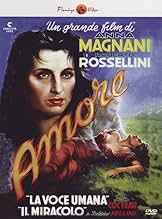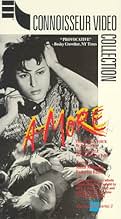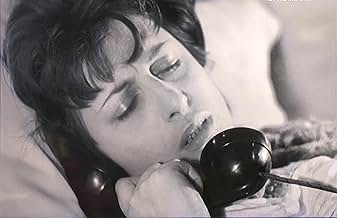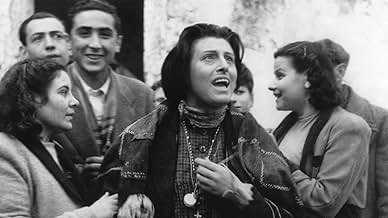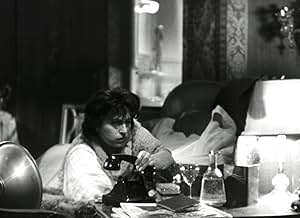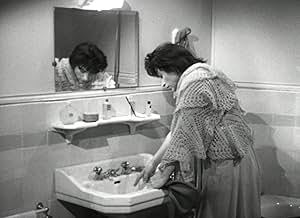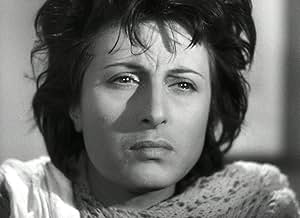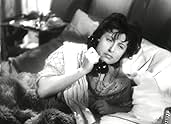AVALIAÇÃO DA IMDb
6,9/10
2,1 mil
SUA AVALIAÇÃO
Adicionar um enredo no seu idiomaIn part one, a heartbroken woman talks to her ex-lover on the phone. In part two, a pregnant woman believes she is carrying the child of Saint Joseph.In part one, a heartbroken woman talks to her ex-lover on the phone. In part two, a pregnant woman believes she is carrying the child of Saint Joseph.In part one, a heartbroken woman talks to her ex-lover on the phone. In part two, a pregnant woman believes she is carrying the child of Saint Joseph.
- Direção
- Roteiristas
- Artistas
- Prêmios
- 2 vitórias e 2 indicações no total
Avaliações em destaque
L'Amore is divided into two parts, the first called "A Human Voice", and the second named "The Miracle". Anna Magnani is wonderful at both. The first episode is about love and sadness. A woman is pursuing for a man who does not love her any longer. The whole episode occurs whitin a bedroom, with Anna and a telephone. The dialogue of Anna with her ex-husband is simply fantastic and very emotive. The second episode, more cryptic and stronger, shows us a medieval Italian town with all its beliefs and supersticions. A woman, Anna Magnani again, makes remember us the mistery of creation, with symbolic references to some christian icons (as virgins, poor people, saints, etc.). In sum, this is a wonderful film.
Long unavailable in its entirety Roberto Rossellini's "L'Amore" remains one of his very greatest films. It is, in fact, two films; the second part, "The Miracle" has been shown separately and ran into censorship problems both in Italy and abroad. Fundamentally, it is a vehicle for Anna Magnani who is quite magnificent. In the first part, Cocteau's monologue "The Human Voice", she is the only person on screen, a lone woman on the telephone to the lover who has left her for another woman. For a good deal of the time Rossellini keeps the camera on that wonderful face and she is heart-breaking.
In the second part she is the deluded peasant seduced, and made pregnant, by none other than Federico Fellini , (who co-wrote the script with Rossellini and Tullio Pinelli). Magnani believes her seducer to be St Jospeh and the baby she is carrying to be some sort of new Messiah, (it was this that so offended the powers that be). Again she is magnificent, (Rossellini dedicated the film 'to the art of Anna Magnani"), in a role totally different from the part she plays in "The Human Voice". It is easy to see how this second part could be released separately from the first, (they are very different in tone), and this small masterpiece is as great a 'short' film as the cinema has given us. Nevertheless, seeing both parts together is testament to the genius of both director and star. Essential.
In the second part she is the deluded peasant seduced, and made pregnant, by none other than Federico Fellini , (who co-wrote the script with Rossellini and Tullio Pinelli). Magnani believes her seducer to be St Jospeh and the baby she is carrying to be some sort of new Messiah, (it was this that so offended the powers that be). Again she is magnificent, (Rossellini dedicated the film 'to the art of Anna Magnani"), in a role totally different from the part she plays in "The Human Voice". It is easy to see how this second part could be released separately from the first, (they are very different in tone), and this small masterpiece is as great a 'short' film as the cinema has given us. Nevertheless, seeing both parts together is testament to the genius of both director and star. Essential.
It could be something of a challenge to be fair to L'Amore as a whole if one of its two shorts, one titled 'The Human Voice' (script by Jean Cocteau) and the other titled 'The Miracle' (original script by Federico Fellini), sold short of the other. But in the end, one only slightly edges out over the other, and not by much, which is really saying something in this case. Italian neo-realist icon Roberto Rossellini changed gears, to a point, after bringing forth his 'post-war' trilogy of films (Roma Citta Aperta, Paisa, Germany Year Zero) that would catapult him into worldwide recognition. This is essentially a small film, in a way smaller and even more (considering his previous trio, amazingly) simplistic in storytelling terms and scope. Instead of war's anguish coming on as the main dread of the existences of the characters, here there are only two key characters for the two stories respectively, and played by the same actress no less.
This could be a gamble for Rossellini, putting so much faith in an actress to pull off two quite different roles (well, maybe not TOO different, there are some underlying qualities to both). Anna Magnani, however, was worth the gamble for him. This is proved right off the bat with 'Voice', where Magnani, for 75 percent of the film's running time, is in either medium-close up or close-up by Rossellini's elegant, probing (without seemingly to try) lens, as Magnani's character has a long, painful, and ultimately confessional conversation with her love who has left her. This is off the bat something that most can identify with; we know what it's like sometimes to be in a room and over-hear an outpouring of emotions through the walls (or sometimes ourselves talking in these conversations), practically wanting not to listen at all. But Cocteau understands that a conversation like this can be made into a kind of extraordinary poetry of sorts, by stripping away at the seams of the human soul (err, voice in this case), and aided by the right person to pull it off. Magnani, therefore, works because she conveys so much in her expressions, her eyes and of course voice, all without having to go into soap opera hysterics. Even towards the end of the film, where some of the momentum is lost, Magnani is like some force that you can't look away from.
This notion that Anna Magnani is in this overall project almost like her own vehicle, as Scorsese has said in his film My Voyage to Italy (which inspired me to seek this out to start with), it's un-thinkable to see anyone else play either of the two roles. This is especially so in 'The Miracle', different from anything else Rossellini had done up till that time (I could be wrong, I haven't seen anything he made pre Roma Citta Aperta) in that it takes place in a time unknown. It could be present day, or hundreds of years ago. It's a fable, with its story origins in a budding cartoonist, Fellini, who also appears here in his one and only acting role as a kind of Vagabond (and quite a suave looking one, ho-ho). Magnani plays the peasant woman, perhaps not altogether in her head, and believes as he passes by she has seen St. Joseph. She stops him, she praises and rambles, he offers her wine, and she passes out. Cut to another time in the future, and she discovers she's pregnant. Never had sex? Hmm...
The Miracle, a film that got in a heap of controversy, and in the process changed a vital point of how films were allowed to be shown in American cinemas from the 50's onward (a little historical fact few know of today), is to me perhaps one of the most powerful 'fables' I've ever seen, at least from people like Rossellini and Fellini (the later made a great career out of fashioning them out of almost nothing). It is also a very telling story about religion and faith, and to my way of thinking still holds a relevance just as meaningful today as back in the later 40's and early 50's. The peasant woman turned homeless that Magnani plays so beautifully (for such a simple character there is enough nuance for two performances) holds onto faith because, frankly, it's all that she has. She gets berated by all the townsfolk- particularly the religious folk for having a child out of wedlock and under such strange circumstances- yet nothing gets in the way of her own determination of what she thinks is true.
Even if you don't have a belief in Catholicism or even just religion, the film has an impact because of elemental questions Rossellini is trying to raise. I can't say what they are here, as they will bring different answers for the individual viewer. But the fact that Fellini and Rossellini are stirring up such thoughts among such touching and near-perfect acting and stylizing (there's even a slight touch of humor in the early scenes with Fellini) and not forcing them on the viewer, not to sound catchy about it, is a miracle in and of itself, and one of the director's best films taking into account the two as L'Amore... Be advised though- as of now this film is EXTREMELY hard to find, and only after many months and more money than I'd care to say I discovered a copy on video, so only if you feel a strong urge to see the film (likely, as with myself, from having seen the clips from My Voyage to Italy) would I recommend it. But if you do, it could serve a very rewarding experience.
This could be a gamble for Rossellini, putting so much faith in an actress to pull off two quite different roles (well, maybe not TOO different, there are some underlying qualities to both). Anna Magnani, however, was worth the gamble for him. This is proved right off the bat with 'Voice', where Magnani, for 75 percent of the film's running time, is in either medium-close up or close-up by Rossellini's elegant, probing (without seemingly to try) lens, as Magnani's character has a long, painful, and ultimately confessional conversation with her love who has left her. This is off the bat something that most can identify with; we know what it's like sometimes to be in a room and over-hear an outpouring of emotions through the walls (or sometimes ourselves talking in these conversations), practically wanting not to listen at all. But Cocteau understands that a conversation like this can be made into a kind of extraordinary poetry of sorts, by stripping away at the seams of the human soul (err, voice in this case), and aided by the right person to pull it off. Magnani, therefore, works because she conveys so much in her expressions, her eyes and of course voice, all without having to go into soap opera hysterics. Even towards the end of the film, where some of the momentum is lost, Magnani is like some force that you can't look away from.
This notion that Anna Magnani is in this overall project almost like her own vehicle, as Scorsese has said in his film My Voyage to Italy (which inspired me to seek this out to start with), it's un-thinkable to see anyone else play either of the two roles. This is especially so in 'The Miracle', different from anything else Rossellini had done up till that time (I could be wrong, I haven't seen anything he made pre Roma Citta Aperta) in that it takes place in a time unknown. It could be present day, or hundreds of years ago. It's a fable, with its story origins in a budding cartoonist, Fellini, who also appears here in his one and only acting role as a kind of Vagabond (and quite a suave looking one, ho-ho). Magnani plays the peasant woman, perhaps not altogether in her head, and believes as he passes by she has seen St. Joseph. She stops him, she praises and rambles, he offers her wine, and she passes out. Cut to another time in the future, and she discovers she's pregnant. Never had sex? Hmm...
The Miracle, a film that got in a heap of controversy, and in the process changed a vital point of how films were allowed to be shown in American cinemas from the 50's onward (a little historical fact few know of today), is to me perhaps one of the most powerful 'fables' I've ever seen, at least from people like Rossellini and Fellini (the later made a great career out of fashioning them out of almost nothing). It is also a very telling story about religion and faith, and to my way of thinking still holds a relevance just as meaningful today as back in the later 40's and early 50's. The peasant woman turned homeless that Magnani plays so beautifully (for such a simple character there is enough nuance for two performances) holds onto faith because, frankly, it's all that she has. She gets berated by all the townsfolk- particularly the religious folk for having a child out of wedlock and under such strange circumstances- yet nothing gets in the way of her own determination of what she thinks is true.
Even if you don't have a belief in Catholicism or even just religion, the film has an impact because of elemental questions Rossellini is trying to raise. I can't say what they are here, as they will bring different answers for the individual viewer. But the fact that Fellini and Rossellini are stirring up such thoughts among such touching and near-perfect acting and stylizing (there's even a slight touch of humor in the early scenes with Fellini) and not forcing them on the viewer, not to sound catchy about it, is a miracle in and of itself, and one of the director's best films taking into account the two as L'Amore... Be advised though- as of now this film is EXTREMELY hard to find, and only after many months and more money than I'd care to say I discovered a copy on video, so only if you feel a strong urge to see the film (likely, as with myself, from having seen the clips from My Voyage to Italy) would I recommend it. But if you do, it could serve a very rewarding experience.
After the opening credits we see a title that says "This film is an homage to the art of Anna Magnani" and that's exactly what this powerful Rossellini film is about. Magnani dominates both sections of "L'Amore" and is quite remarkable. In the first section which is called "Una Voce Umana"(The Human Voice), Magnani plays a woman in her bedroom who makes a desperate telephone call with her former husband. It is mostly comprised of close-ups of Magnani's grieving face, anticipating those of Rossellini's films starring Ingrid Bergman. In the second section, "Il Maracolo"(The Miracle), Magnani is a peasant who meets and is seduced by a vagabond whom she thinks is Saint Joseph. Though the villagers incessantly ridicule her, she thinks is pregnant with a Christ baby, something that angered the censors and religious groups, ultimately dubbing as "blasphemous". "The Miracle" section is by far the most powerful and provocative". It is characterized by overt Christian symbolism and some gorgeous shots of the countryside. Rossellini makes the viewer aware of the overpowering presence of the environment, itself another character. The scenes where Magnani is lying on the ground surrounded by animals are particularly ravishing and beautiful.
Initially banned in the UK, only the section entitled THE MIRACLE was shown by special permission of the London County Council. Somehow people seem to persist in interpreting the story as a Second Coming narrative, whereas the character played by Anna Magnani only believes she is to bear a "special" child as a reward for her piety. There is not a shred of evidence to suggest she believes she is carrying the Christ-child. Dubbed by the Vatican as "a sacrilegious blasphemy", it is ironic that, as an atheist, the power and emotional intensity of this film brought me the closest I have ever been to what could perhaps be termed a transcendental experience. A masterpiece.
Você sabia?
- CuriosidadesWhen, in 1952, the "Il Miracolo" segment of the film was released in the United States as "The Miracle", it was the subject of a legal battle in which the Supreme Court ruled for the first time that motion pictures, like books and newspapers, were protected under the First Amendment to the Constitution.
- Citações
La donna al telefono (segment "Una voce umana"): What? My black satin dress. Yes, I'm still wearing it. No, I didn't smoke. Just three cigarettes. I swear
- ConexõesEdited into Histoire(s) du cinéma: Une histoire seule (1989)
Principais escolhas
Faça login para avaliar e ver a lista de recomendações personalizadas
- How long is Love?Fornecido pela Alexa
Detalhes
- Tempo de duração
- 1 h 9 min(69 min)
- Cor
- Proporção
- 1.37 : 1
Contribua para esta página
Sugerir uma alteração ou adicionar conteúdo ausente

